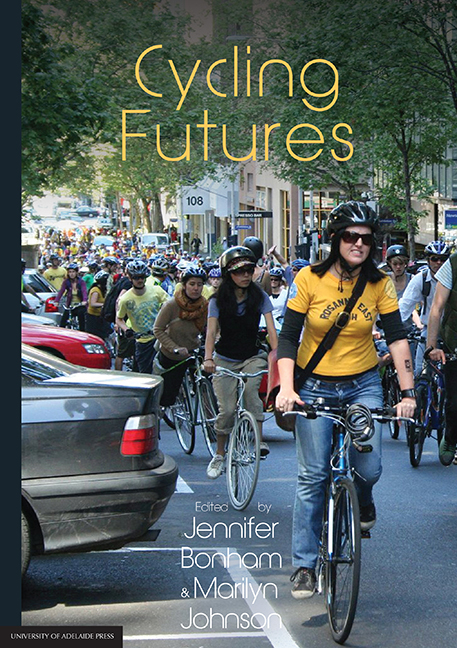Book contents
- Frontmatter
- Contents
- Preface
- Editors
- Contributors
- PART I Current challenges
- PART II Strategies for change
- 9 Gender and cycling: Gendering cycling subjects and forming bikes, practices and spaces as gendered objects
- 10 Making (up) the child cyclist: Bike Ed in South Australia
- 11 More than a message: Producing cyclists through public safety advertising campaigns
- 12 Spaces for cycling
- 13 Off-road cycling infrastructure
- 14 Teaching Australian civil engineers about cycling
- 15 What should planners know about cycling?
- 16 Skilling landscape architects and urban designers for design of bicycle parking and network facilities
- 17 Cycling and Australian law
18 - Evaluating cycle promotion interventions
from PART II - Strategies for change
Published online by Cambridge University Press: 25 July 2017
- Frontmatter
- Contents
- Preface
- Editors
- Contributors
- PART I Current challenges
- PART II Strategies for change
- 9 Gender and cycling: Gendering cycling subjects and forming bikes, practices and spaces as gendered objects
- 10 Making (up) the child cyclist: Bike Ed in South Australia
- 11 More than a message: Producing cyclists through public safety advertising campaigns
- 12 Spaces for cycling
- 13 Off-road cycling infrastructure
- 14 Teaching Australian civil engineers about cycling
- 15 What should planners know about cycling?
- 16 Skilling landscape architects and urban designers for design of bicycle parking and network facilities
- 17 Cycling and Australian law
Summary
Introduction
Research and evaluation play a crucial role in providing the evidence base for effective action to increase the bicycle mode share of transport in countries such as the United States, United Kingdom and Australia, which currently have low levels of utilitarian cycling. The terms ‘research’ and ‘evaluation’ are often used interchangeably, and while they share the common goal of answering questions based on data and evidence, there are also some important differences. A great deal of cycling research focuses on monitoring trends in cycling participation over time or across countries, and identifying factors that influence cycling behaviour. This type of problem-focused research is useful for understanding the nature of the ‘problem’ (that is, low levels of cycling) and its determinants (that is, supports and constraints on cycling) as a basis for taking action to address it.
Evaluation, on the other hand, is solution-focused research (Robinson & Sirard, 2005). It asks important questions about whether interventions aimed at increasing cycling participation are having the desired effects, and what can be done differently to improve our efforts. Currently, the cycling promotion literature focuses on the determinants of cycling, with relatively few evaluations of policies and programs designed to increase cycling. The deficit is particularly marked for evaluations employing the more rigorous evaluation designs, although, as outlined in this chapter, some innovative study designs are currently being developed and applied to address this deficit.
This chapter focuses on the evaluation of interventions aimed at increasing cycling participation in low-cycling countries such as the United States, United Kingdom and Australia. It is not a review of the effectiveness of cycling interventions, as several of these have been published elsewhere (Möser & Bamberg, 2008; Hosking, Macmillan, Connor, Bullen, & Ameratunga, 2010; Pucher, Dill, & Handy, 2010; Yang, Sahlqvist, McMinn, Griffin, & Ogilvie, 2010; Martin, Suhrcke, & Ogilvie, 2012). Nor is it a comprehensive ‘how-to’ manual for evaluating cycling promotion initiatives. The chapter includes some elements of cycling promotion evaluation designs, methods and findings, but the focus is on the key issues associated with the evaluation of cycling interventions.
- Type
- Chapter
- Information
- Cycling Futures , pp. 429 - 452Publisher: The University of Adelaide PressPrint publication year: 2015



